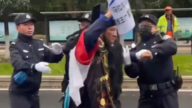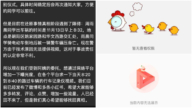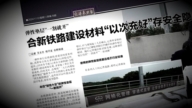【新唐人2013年03月28日訊】3月24號,重慶青年黃成城,終於和相戀7年的女友舉行了婚禮。新郎黃成城,在薄熙來和王立軍主政重慶期間,因所謂「茉莉花言論」被判兩年勞教。新娘陳玲苦等7年,不離不棄。民衆在感動於兩人的真情之際,再次呼籲能夠廢除這個臭名昭著的勞教制度。
2011年,受到「突尼斯茉莉花革命」的鼓舞,中國民間也一度興起「茉莉花活動」,民眾以和平聚會、散步的方式訴求變革。黃成城因爲在互聯網的聊天網站QQ上,發出請朋友喝「花茶」等貼子,被重慶市壁山縣公安局抓捕。當時的重慶政府以「煽動顛覆國家政權罪」,判處黃成城兩年勞教。
同樣參加了「茉莉花活動」的大陸律師李天天認爲,黃成城被勞教,的確和當時的重慶當權者有關。
大陸律師李天天:「在上次茉莉花事件中,我認爲受欺負最重的,就應該是這個人(黃成城),勞教了兩年。在一個邪惡的領導者的統治下,這些事情確實就做的更絕了。」
隨著薄熙來和王立軍的倒臺,他們主政重慶期間的黑幕被揭開。黃成城兩年勞教的刑罰,經過家人多次提起行政訴訟,終於在去年12月17號被撤銷。但當時他已經被限制人身自由641天。今年1月3號,黃成城提出了國家賠償申請書,重慶勞教委同意支付10萬4千多元人民幣的賠償金。
類似黃成城這樣的冤案,從去年下半年後不斷出現,讓重慶勞教委深陷訴訟漩渦。不過,即使從目前得到糾錯的勞教案來看,沒有一起案子是重慶市勞教委主動糾錯的。
大陸律師唐荊陵:「目前可能披露出來很多是和重慶有關的,好像集中針對重慶的案子,好像覺得它很荒唐。其實這種事情在各個地方多的很哪。你比如説像上訪的訪民:法輪功的修煉者,或者基督徒們,各個省份都不少的。」
勞教被撤銷後,黃成城和陳玲終於迎來了晚到7年的婚禮。
唐荊陵:「勞教是一個暴政,它是基於官僚個人的意志,可以對人進行這種最多長達4年的,剝奪自由的處罰。而且在關押期間,你一般要做苦工。」
在分開的600多個日夜裏,新娘陳玲一直堅守著對黃成城的承諾。實際上,這並不是這對戀人的第一次分離。在此之前,黃成城已因類似的原因獲刑5年,當時,陳玲也是這樣默默的等待他的歸來。
李天天認爲,人們的交流和真情,會讓官方感到害怕。
李天天:「精神上的這種互相支持和鼓勵,這是它們害怕的,它們就希望把這些異議人士都孤立起來,讓你從精神、尊嚴方面找不見自信,最後他們就好進行穩定統治了。所以這是極其邪惡的政權。而這些事情他們不報導,老百姓很難知道。」
中共最早從蘇聯引進勞動教養制度,後來經過改動,形成中共特有的限制人身自由、強迫勞動、改造思想的制度。中國法學界有很多學者指出,勞教制度本身違反了「憲法」,「立法法」,「行政處罰法」,也和中共簽署的人權公約相悖,在實施方面,更有許多濫用權力的違法現象,嚴重損害了公民的權利。
大陸法學專家趙遠明:「習近平上臺以後,要對勞教制度進行改革。我覺得應該把這個勞教制度徹底廢除。否則的話,這個勞教制度還會繼續危害中國人民。這個是一個非常邪惡的法制。」
今年1月7號上午,中央政法委書記孟建柱在全國政法工作會議上宣佈,中央已研究,報請全國人大常委會批准後,今年將停止使用勞教制度。不過,之後,國內媒體又改口為「改革」勞教制度。
雖然,廢除勞教制度,被外界一致認爲是「習李新政」的最好切入點,但是國內也有學者認為,在5年之內,習、李可能不會有太多進展。
採訪李韻 編輯尚燕 後製李智遠
Unstoppable True Love in China
On March 24, Huang Chengcheng from Chongqing
finally married his girl friend of 7 years.
Huang was sentenced to two years of forced labor camp,
during the ruling period of Bo Xilai and Wang Lijun, for the so-called “Jasmine Talk.”
Chen Ling, his girl friend, has waited for seven years
to marry Huang.
People were so moved by their true love and once again
called for the abolition of re-education through labor system.
In 2011, inspired by the Tunisian Jasmine Revolution,
Jasmine activities were also rising in China.
People in China had peaceful gatherings,
walking and demanded changes.
Huang Chengcheng was arrested for chatting on QQ Net.
He was charged of inciting subversion of state power,
and sentenced to two years of forced labor camp.
Mainland lawyer Li Tiantian, who also participated
in Jasmine activities, believes that Huang’s arrest had
a lot to do with the rulers of Chongqing at that time.
Lawyer Li: “Huang Chengcheng was being punished
the harshest in Jasmine incidents.
Two years in a forced labor camp is indeed terrible
under an evil leader.”
Following the downfall of Bo Xilai and Wang Lijun,
their wrongdoings were exposed.
After Huang’s relatives brought up legal proceedings,
Huang’s case was dismissed on December 17, 2012.
However, Huang was in the labor camp for 641 days.
On January 2013, Huang sued the state for compensation.
The Chongqing labor camp Commission
has agreed to pay him more than 104,000 yuan.
Many similar cases of injustice surfaced in
the second half of 2012.
The Chongqing labor camp Commission
has been knee deep in litigation.
So far, not even one case was initiated
by the Chongqing labor camp Commission.
Mainland lawyer Tang Jing Ling: “Currently, many cases
are associated with Chongqing. It seems absurd to focus
on cases from there only.
In fact, that happens in many places.
For example, many are petitioners, Falun Gong practitioners,
and Christians from all other provinces.”
Huang Chengcheng and Chen Ling were finally ushered
to their own wedding, which is seven years late.
Tang Jingling: “Labor camp is a tyranny. It is based on an
official’s wish, which deprives others of their freedom.
The maximum is up to four years.
During the detention, one must do hard labor.”
During more than 600 days of separation,
Chen Ling remained truly committed.
In fact, that was not the first separation they experienced.
Huang was sentenced to5 years of forced labor before.
At that time, Chen Ling also silently waited for his return.
Li Tiantian believes that people’s sharing and
true feelings scare officials.
Li Tiantian: “Officials are afraid of Mutual spiritual
support and encouragement.
They want to isolate these dissidents
and make them lose their confidence.
They hope to gain political stability by doing that.
This is the evilest regime. Of course, they refuse to report these
events, so the ordinary people will not know what has happened.”
The Chinese Communist Party (CCP) imported
the re-education through labor from the Soviet.
After some modifications, it becomes a specific method to restrict
personal freedom, forced labor, and transform people’s thoughts.
Chinese legal circles, many scholars have pointed out that
the re-education through labor system is illegal.
It violates not only China’s Constitution, the Legislative Act,
the Administrative Punishment Law, but also human rights
convention co-signed by the CCP.
In addition, during the implementation, many illegal abuse
of power occurred and seriously damage the rights of citizens.
Mainland legal experts Zhao Yuanming:
“After Xi Jinping came to power, he wanted to reform the forced labor system.
I think he ought to abolish it completely.
Otherwise. this system will continue to hurt the Chinese people.
It is an evil rule of law.”
On January 7, 2013, Meng Jianzhu, the secretary of
the Central Political and Law Commission,
announced that after the approval by the Standing Committee
of the National People’s Congress,
the re-education through forced labor system will not be used.
However, later the Mainland media changed its reporting to
“reform” of the re-education through labor system.
Although observers believe the abolition of re-education through
labor system is the best starting point for the new Xi-Li team.
Yet, other scholars think that Xi-Li will not gain much ground
within the next 5 years.





























